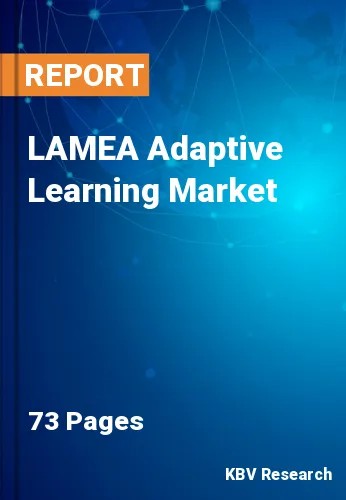The Latin America, Middle East and Africa Adaptive Learning Market would witness market growth of 24.4% CAGR during the forecast period (2023-2030).
Natural language processing is an innovative feature in these learning systems that enables platforms to understand and respond to students' written or spoken language. This innovation facilitates more interactive and conversational learning experiences. NLP facilitates conversational interactions between students and these learning system. Instead of rigid question-answer formats, students can engage in more natural and dynamic conversations. This approach makes the learning experience more engaging and mimics real-life communication scenarios, promoting a deeper understanding of the material.
In addition, some learning platforms incorporate emotional intelligence analytics to gauge students' emotional states during learning. This innovation aims to provide personalized support based on students' emotional responses, fostering a positive learning environment. Emotional intelligence analytics leverage various data points, such as facial expressions, tone of voice, and behavioral patterns, to recognize students' emotional states. By employing advanced algorithms and machine learning, these learning platforms can identify indicators of emotions like frustration, engagement, curiosity, or even boredom.
SMEs in Brazil, like businesses globally, recognize the importance of a skilled workforce. As these enterprises grow, there is a heightened emphasis on employee training and development. These learning solutions offer a flexible and personalized approach to training, allowing SMEs to upskill their employees efficiently. As per the data released in 2022 by the U.S. Embassy and Consulates, there were 30 million micro, small, and medium-sized enterprises (MSMEs) in Brazil, accounting for 30 percent of the country’s GDP. Registered MSMEs provide over 50 percent of all jobs in the formal sector, and between January and October 2021, almost 73% of formal jobs created in Brazil were in small businesses. Therefore, the MSME expansion in the LAMEA region will boost the growth of the regional market.
The Brazil market dominated the LAMEA Adaptive Learning Market by Country in 2022, and would continue to be a dominant market till 2030; thereby, achieving a market value of $340.6 Million by 2030. The Argentina market is showcasing a CAGR of 25.1% during (2023 - 2030). Additionally, The UAE market would register a CAGR of 24% during (2023 - 2030).
Free Valuable Insights: The Worldwide Adaptive Learning Market is Projected to reach USD 15.4 Billion by 2030, at a CAGR of 21.8%
Based on Component, the market is segmented into Platform, and Services. Based on End-user, the market is segmented into K-12, Higher Education Institutions, Corporate, and Others. Based on countries, the market is segmented into Brazil, Argentina, UAE, Saudi Arabia, South Africa, Nigeria, and Rest of LAMEA.
By Component
By End-user
By Country
Our team of dedicated experts can provide you with attractive expansion opportunities for your business.

